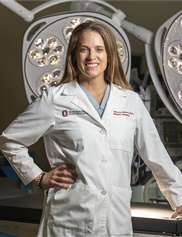Why Choose a Board-Certified Plastic Surgeon
Choose a board-certified plastic surgeon and be confident you are in the care of a highly trained surgeon you can trust.

Abdominoplasty – or a tummy tuck, as it is more commonly known – is a cosmetic surgery procedure that tightens the muscles and removes loose skin and fat from the abdomen so that it appears flat and toned.
Mostly associated with "mommy makeovers," a procedure that allows women to restore their figures after pregnancy, abdominoplasty is also used to help patients that have undergone extreme weight loss in a short period of time.
Between 2000 and 2014, the number of tummy tuck procedures rose an impressive 87 percent, according to the American Society of Plastic Surgeons. Many procedures were, no doubt, for cosmetic reasons, but there are several medical benefits to be gained after the procedure.
After a vaginal birth, some women can develop Stress Urinary Incontinence (SUI), a bladder control problem associated with uncontrollable leakage brought on by coughing, sneezing, exercising or even laughing.
In most cases, SUI is treated without surgery. For patients who require more care, several studies have indicated that a tummy tuck can aid in recovery especially in patients that have not had a caesarian section. During the procedure, a slight bladder obstruction is created using soft tissue near the pelvic area, thereby reducing incontinence.
After extreme weight loss or multiple pregnancies, stomach muscles can become distended, and diet and exercise alone cannot help. A tummy tuck surgically tightens weak muscles, while removing excess skin and fat, to flatten the abdomen.
Weak abdominal muscles are often associated with lordosis, or sway back. After an abdominoplasty, patients may notice that their posture has improved significantly, thanks to the tightened muscles supporting their spine. The improved support and better posture can have the added benefit of relieving certain types of back pain.
A ventral hernia occurs when the intestine or abdominal tissue breaks through the abdominal wall and forms a pocket or sack. There are several potential causes, including abdominal weakness caused by massive weight loss or surgeries like C-sections or appendectomies.
The underlying symptoms that require a ventral hernia correction are remarkably similar to those for abdominoplasty. Both surgeries correct weakened adnominal muscles and pressure on the skin. No matter the cause, whether pregnancy or weight, a weak abdominal wall will allow a hernia to form.
Once you develop a ventral hernia, it is very easy for it to happen again. Often, your surgeon will weigh the benefits of adding an abdominoplasty procedure to the hernia repair to strengthen the abdominal wall and prevent future occurrences. Combining the procedures is not only safe, but very practical, as it can reduce medical expenses and recovery time.
Due to its growing popularity, many people believe that a tummy tuck is an easy procedure. It's important for patients to realize that it is still a major operation, requiring one to five hours in the operating room, under general anesthesia.
A typical abdominoplasty removes up to 10 pounds of stomach fat by disconnecting the skin from the underlying tissue, suturing abdominal tissue, and cutting away any extra skin. A full recovery can take several weeks, and just like any other surgery, there are risks of infection and other complications.
That said, the various medical and cosmetic benefits of a tummy tuck make the procedure appealing for many people. Interested patients should discuss the procedure in detail with their surgeon and consider all the advice before deciding whether to undergo surgery.
The views expressed in this blog are those of the author and do not necessarily reflect the opinions of the American Society of Plastic Surgeons.













